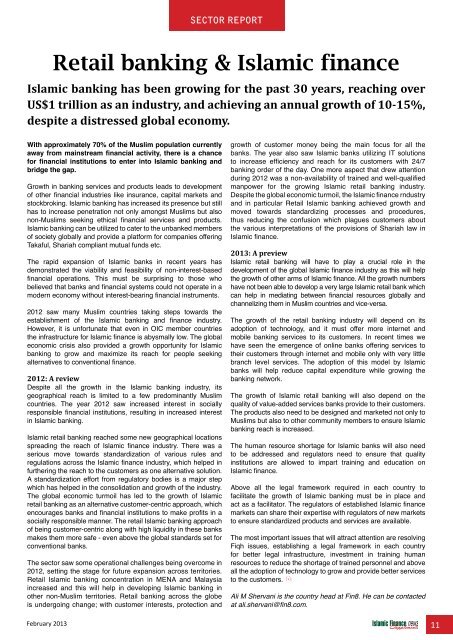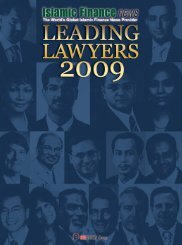View PDF Edition - Islamic Finance News
View PDF Edition - Islamic Finance News
View PDF Edition - Islamic Finance News
You also want an ePaper? Increase the reach of your titles
YUMPU automatically turns print PDFs into web optimized ePapers that Google loves.
sector report<br />
Retail banking & <strong>Islamic</strong> finance<br />
<strong>Islamic</strong> banking has been growing for the past 30 years, reaching over<br />
US$1 trillion as an industry, and achieving an annual growth of 10-15%,<br />
despite a distressed global economy.<br />
With approximately 70% of the Muslim population currently<br />
away from mainstream financial activity, there is a chance<br />
for financial institutions to enter into <strong>Islamic</strong> banking and<br />
bridge the gap.<br />
Growth in banking services and products leads to development<br />
of other financial industries like insurance, capital markets and<br />
stockbroking. <strong>Islamic</strong> banking has increased its presence but still<br />
has to increase penetration not only amongst Muslims but also<br />
non-Muslims seeking ethical financial services and products.<br />
<strong>Islamic</strong> banking can be utilized to cater to the unbanked members<br />
of society globally and provide a platform for companies offering<br />
Takaful, Shariah compliant mutual funds etc.<br />
The rapid expansion of <strong>Islamic</strong> banks in recent years has<br />
demonstrated the viability and feasibility of non-interest-based<br />
financial operations. This must be surprising to those who<br />
believed that banks and financial systems could not operate in a<br />
modern economy without interest-bearing financial instruments.<br />
2012 saw many Muslim countries taking steps towards the<br />
establishment of the <strong>Islamic</strong> banking and finance industry.<br />
However, it is unfortunate that even in OIC member countries<br />
the infrastructure for <strong>Islamic</strong> finance is abysmally low. The global<br />
economic crisis also provided a growth opportunity for <strong>Islamic</strong><br />
banking to grow and maximize its reach for people seeking<br />
alternatives to conventional finance.<br />
2012: A review<br />
Despite all the growth in the <strong>Islamic</strong> banking industry, its<br />
geographical reach is limited to a few predominantly Muslim<br />
countries. The year 2012 saw increased interest in socially<br />
responsible financial institutions, resulting in increased interest<br />
in <strong>Islamic</strong> banking.<br />
<strong>Islamic</strong> retail banking reached some new geographical locations<br />
spreading the reach of <strong>Islamic</strong> finance industry. There was a<br />
serious move towards standardization of various rules and<br />
regulations across the <strong>Islamic</strong> finance industry, which helped in<br />
furthering the reach to the customers as one alternative solution.<br />
A standardization effort from regulatory bodies is a major step<br />
which has helped in the consolidation and growth of the industry.<br />
The global economic turmoil has led to the growth of <strong>Islamic</strong><br />
retail banking as an alternative customer-centric approach, which<br />
encourages banks and financial institutions to make profits in a<br />
socially responsible manner. The retail <strong>Islamic</strong> banking approach<br />
of being customer-centric along with high liquidity in these banks<br />
makes them more safe - even above the global standards set for<br />
conventional banks.<br />
The sector saw some operational challenges being overcome in<br />
2012, setting the stage for future expansion across territories.<br />
Retail <strong>Islamic</strong> banking concentration in MENA and Malaysia<br />
increased and this will help in developing <strong>Islamic</strong> banking in<br />
other non-Muslim territories. Retail banking across the globe<br />
is undergoing change; with customer interests, protection and<br />
growth of customer money being the main focus for all the<br />
banks. The year also saw <strong>Islamic</strong> banks utilizing IT solutions<br />
to increase efficiency and reach for its customers with 24/7<br />
banking order of the day. One more aspect that drew attention<br />
during 2012 was a non-availability of trained and well-qualified<br />
manpower for the growing <strong>Islamic</strong> retail banking industry.<br />
Despite the global economic turmoil, the <strong>Islamic</strong> finance rndustry<br />
and in particular Retail <strong>Islamic</strong> banking achieved growth and<br />
moved towards standardizing processes and procedures,<br />
thus reducing the confusion which plagues customers about<br />
the various interpretations of the provisions of Shariah law in<br />
<strong>Islamic</strong> finance.<br />
2013: A preview<br />
<strong>Islamic</strong> retail banking will have to play a crucial role in the<br />
development of the global <strong>Islamic</strong> finance industry as this will help<br />
the growth of other arms of <strong>Islamic</strong> finance. All the growth numbers<br />
have not been able to develop a very large <strong>Islamic</strong> retail bank which<br />
can help in mediating between financial resources globally and<br />
channelizing them in Muslim countries and vice-versa.<br />
The growth of the retail banking industry will depend on its<br />
adoption of technology, and it must offer more internet and<br />
mobile banking services to its customers. In recent times we<br />
have seen the emergence of online banks offering services to<br />
their customers through internet and mobile only with very little<br />
branch level services. The adoption of this model by <strong>Islamic</strong><br />
banks will help reduce capital expenditure while growing the<br />
banking network.<br />
The growth of <strong>Islamic</strong> retail banking will also depend on the<br />
quality of value-added services banks provide to their customers.<br />
The products also need to be designed and marketed not only to<br />
Muslims but also to other community members to ensure <strong>Islamic</strong><br />
banking reach is increased.<br />
The human resource shortage for <strong>Islamic</strong> banks will also need<br />
to be addressed and regulators need to ensure that quality<br />
institutions are allowed to impart training and education on<br />
<strong>Islamic</strong> finance.<br />
Above all the legal framework required in each country to<br />
facilitate the growth of <strong>Islamic</strong> banking must be in place and<br />
act as a facilitator. The regulators of established <strong>Islamic</strong> finance<br />
markets can share their expertise with regulators of new markets<br />
to ensure standardized products and services are available.<br />
The most important issues that will attract attention are resolving<br />
Fiqh issues, establishing a legal framework in each country<br />
for better legal infrastructure, investment in training human<br />
resources to reduce the shortage of trained personnel and above<br />
all the adoption of technology to grow and provide better services<br />
consulting www.<strong>Islamic</strong><strong>Finance</strong>Consulting.com<br />
www.<strong>Islamic</strong><strong>Finance</strong>Events.com<br />
to the customers.<br />
www.<strong>Islamic</strong><strong>Finance</strong><strong>News</strong>.com<br />
www.<strong>Islamic</strong><strong>Finance</strong>Training.com<br />
www.MIFforum.com<br />
www.MIFmonthly.com<br />
www.MIFtraining.com<br />
www.REDmoneyBooks.com<br />
Ali M Shervani is the country head at Fin8. He can be contacted<br />
at ali.shervani@fin8.com.<br />
February 2013 11
















